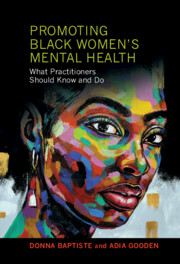Book contents
- Promoting Black Women’s Mental Health
- Promoting Black Women’s Mental Health
- Copyright page
- Contents
- Figures
- Tables
- Contributors
- Introduction
- Part I Black Women in Context
- Part II Therapy Contexts
- 6 Therapists’ Cultural Self-Awareness
- 7 Building Strong and Effective Alliances with Black Female Clients
- Part III Core Themes in Black Women’s Stress and Distress
- Part IV Helping Black Women Recover and Thrive
- Appendix
- Index
- References
7 - Building Strong and Effective Alliances with Black Female Clients
from Part II - Therapy Contexts
Published online by Cambridge University Press: 22 June 2023
- Promoting Black Women’s Mental Health
- Promoting Black Women’s Mental Health
- Copyright page
- Contents
- Figures
- Tables
- Contributors
- Introduction
- Part I Black Women in Context
- Part II Therapy Contexts
- 6 Therapists’ Cultural Self-Awareness
- 7 Building Strong and Effective Alliances with Black Female Clients
- Part III Core Themes in Black Women’s Stress and Distress
- Part IV Helping Black Women Recover and Thrive
- Appendix
- Index
- References
Summary
In this chapter, we highlight key approaches to building strong therapeutic relationships with Black female clients. We also review the challenges that therapists may face in building strong therapeutic relationships with Black women and provide strategies to overcome these challenges. We discuss the occurrence of microaggressions in therapy and provide specific strategies for how to frame conversations about micro-aggressions to validate historical and present client experiences both in and outside of therapy.
- Type
- Chapter
- Information
- Promoting Black Women's Mental HealthWhat Practitioners Should Know and Do, pp. 163 - 188Publisher: Cambridge University PressPrint publication year: 2023



